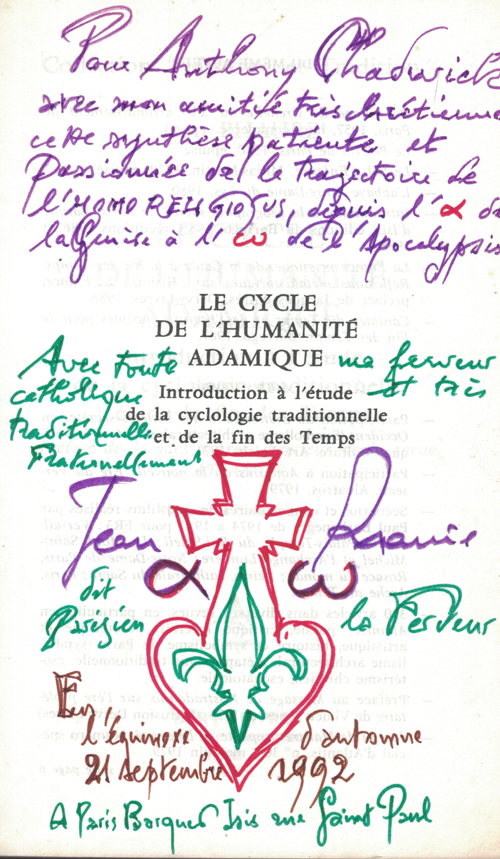
I have just received my printed copies of my new autobiography Priest and Sailor. It can be directly ordered from Lulu. Their printing and delivery service is incredibly efficient. Here are some prefaces that have been written:
You are definitely one of the most insightful writers I’ve encountered online and one of the most interesting. I just learned you were personally present at Econe for the infamous SSPX consecrations, for example, which blew my mind. You have a deep knowledge of the history of modern traditionalist and independent Catholicism, and all of what I know about the latter has come from what you’ve written, and much about the former. After all, as you detail in your book, you lived through the rise and fall of many of these movements.
Your story is tragic, a tale of being systematically failed by institutional Christianity. Nevertheless, your faith seems to me very deep and sensitive, rooted in something much richer and more human than authorities and canon law. A truly human Christianity is what you represent, a feeling Christianity, a wild Christianity (to steal an idea from Sheldrake), or as you call it, “Romantic Christianity.” If the modern Church doesn’t rediscover this spirit, it will surely perish.
For my sins, I am a Roman Catholic, and it’s clear to me the Church is so much poorer for managing to chase free spirits like you away. But perhaps you are richer for it, unburdened by the sterile mediocrities who deign to speak for God, who inwardly are ravening wolves, with fists full of stones and serpents.
James A. Waldrop, Jr.
* * *
This book is a personal and intimate account of contemporary Traditionalist Catholicism, Continuing Anglicanism and Independent Sacramentalism. It has many aspects that parallel my own experience, but the events accounted here are more extreme than anything I have had to contend with. I thank God that I avoided all the abuse the author received.
The author now lives as a semi-hermit. His story is simultaneously tragic and inspiring. It is a tale of the systematic failure of institutional Christianity. It is amazing that the author remains so psychologically healthy and whole after all the trauma he has gone through. His faith is deep, and is rooted in something much richer and more human than authority and legalism. It is as if he died and is now risen again to a vision of priesthood that is prophetic and counter-cultural.
I concur with his evaluation of the SSPX et al, and of the wider plague of “clericalism” and slavish “obedience” towards manifestly wicked superiors; moreover I empathise with his emphasis on hope. With a voice as pastoral as it is prophetic, he inspires us to follow Christ, and to respond to his Mystery with integrity of soul.
Stephen Lovatt, Author, Philosopher and Scientist
* * *
Anyone interested in the history of the smaller churches and Catholic traditionalism, will find much of interest here, given the breadth of Father Anthony’s experience. However, the primary value of this book is the author’s arrival at a different way of seeing priesthood and community, appropriate to our time. Father Anthony lives into a prophetic, mystical exercise of the priesthood. With a voice as pastoral as it is prophetic, he inspires us to follow Christ, and to respond to his Mystery with our whole person.
John Plummer, priest, academic and author of The Many Paths of the Independent Sacramental Movement
* * *
“You are an individual,” I was often told — as an admonition — at school, which I took to mean that I enjoyed doing things my own way, not the obvious way, and not the obvious things. This distorted use or abuse of the word “individual” has happily gone out of fashion, but I will revive it here to commend this unusual life story of an individual and a polymath, Anthony Chadwick.
A multidisciplinary being and a modest one, Chadwick’s polymathy is never arrogant and he does not conflate breadth of knowledge with perfection — completeness — of knowledge. His reminiscences are thought-provoking and supremely readable, and for someone like me, who recognises many of the settings and situations, Chadwick’s observations and anecdotes sparkle and resonate. He is an inquisitive, questioning narrator, not a would-be sage imparting wisdom, and though not exactly a spiritual testament, Chadwick’s book is filled with spirituality. He is fair in his critical observations, for example of traditionalist-Catholic subculture, and never mocking; the book’s interjections of humour are welcome and never misplaced.
Like all good autobiography, this book goes beyond mere memoir and reveals much of the author’s worldview, how that worldview was formed, and which are its compass points. Chadwick himself comments on the dualist aspect of any life story, including his own — how we see ourselves and how we are seen — but in spite of the book’s two-part title, the author’s story is far from simplistic. The title is ultimately profoundly fitting — Chadwick’s story is full of sacrifices and blessings, and it reads like a solitary but rewarding voyage.
Edward Jarvis FRAS FRHistS (born 1975) is a British author of religious history, politics and theology, and an Anglican clergyman. His books address previously under-researched topics such as the Independent Sacramental Movement and aspects of the introduction of Christianity in Southeast Asia, specifically in Vietnam, Myanmar (Burma), Malaysia, and Singapore.
* * *
Since the liturgical revisions of the late nineteen sixties to seventies, which affected both the vernacular language and manner of celebrating the Mass and other services in both the Roman Catholic and Anglican denominations; there has been an increase in the number of so-called independent churches and priests seeking to maintain the traditional forms of worship – along with a small number of umbrella groupings seeking to act as a focal point to that goal.
There have been bishops and priests operating outside the sphere of the mainstream denominations for a hundred and fifty years or more; and some would pejoratively hold that many of these individuals have been cranks, charlatans, and eccentric oddballs. My own experience in this sector has indicated to me that the vast majority of people involved are honest people who are answering God’s call upon their lives in an integral way, in accordance with how their experience of life and the wider church have revealed the divine will to them. Fr Anthony is such a person.
I came into contact with his blog writings through a mutual friend, who had suggested that with his Anglican background and similar abilities as an organist to myself, he may prove an ideal spiritual companion for common aspects of our individual journeys. That has been proven to be the case.
‘Priest and Sailor’ is an autobiographical account of Fr Anthony’s journey to priesthood, his viewpoint on ministering in a secularised environment within the framework of Continuing Anglicanism, and how the other elements of life as a musician, organ builder, and sailor have informed his ministry.
I pray that you, the reader, may be inspired by his journey and contribution to spiritual thinking; that it may deepen aspects of your own journeys of faith.
Dom Paul-Bernarde, Congregation of St Romuald, February 2026



